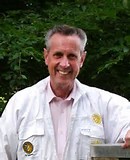Phil McAnespie – Beekeeping – 7 November 2017
The club was buzzing on Tuesday evening when our guest speaker was Phil McAnespie. Phil, a locally well-known and respected beekeeper had previously talked to the club some four years ago and had come to update us on how bee populations were faring in the present day environment. He considered that the greatest threat to bees today was himself; by which, presumably, he meant “man”. Wetter summers, possibly brought about by climate change, has made life difficult for bee colonies, particularly in western Scotland. Suitable foraging days are fewer and honey bees are more dependent on their stores which means less honey for the beekeepers. However, feral colonies are now largely absent and so beekeeping is essential to the continuation of this species of pollinators.
After taking us on a trip around the world describing the variety of hives and the different locations Phil told us how urban bee populations were generally faring well, many of them in rooftop hives. This was due to the presence of trees in towns which provided nectar for the bees. The nectar from wild meadow flowers also gives bees essential protein but many popular garden flowers bought in garden centres are sterile. Phil also explained that the popular, cheaper honeys tended to be pasteurised blends, which process kills off the beneficial enzymes in the honey. Generally, the darker the honey the better the quality and many UK honeys are very good, as is the outrageously expensive Manuka honey from New Zealand. Here however, Phil warned us to be wary since more Manuka honey was sold than was actually produced!
Alex Thompson thanked Phil for his entertaining talk and observed that, for an ex-policeman who didn’t like honey, he certainly knew a lot about his subject.


